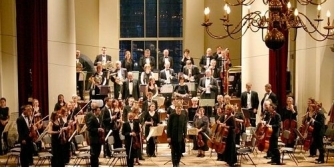Details
St Barnabas Church
Pitshanger Lane
Ealing
London
W5 1QG
England
Programme
Pyotr Tchaikovsky – Piano Concerto no.1, Op.23
Aleksey Davidov – Hymn, for 12 Cellos
Carl Nielsen – Aladdin, Op.34
Jean Sibelius – Symphony no.1 in E minor, Op.39
Performers
George Harliono – piano
John Gibbons – Conductor
Ealing Symphony Orchestra
Programme Note
Tchaikovsky’s first piano concerto had a difficult start in life. It was the first concerto he wrote professionally, with its first iteration completed in 1874. Unfortunately its intended soloist, Nikolai Rubenstein, was utterly scathing of it, calling it “worthless and unplayable” and “vulgar”. Upset, Tchaikovsky found another soloist, Hans von Bülow, for the premiere, and while the audience liked the piece the concert was marred by poor accompaniment from the under-rehearsed orchestra. Bülow was so frustrated at with the orchestra in a tutti that during the performance he was heard to mutter “the brass may go to hell”. The second performance, however, was much more of a success. Tchaikovsky revised the concerto twice, and the 1888 version is the one usually played today. Ealing Festival and Ealing Symphony Orchestra Concerto Award winner George Harliono joins us for this performance.
Carl Nielsen’s Aladdin was originally written to accompany an adaptation of the Danish romantic poem of the same name. The piece was originally written to accompany the entire 80-minute production, but the director decided to cut large amounts of it. Nielsen demanded his name be removed from the programme as a result. Little is known about the production itself and it was not a success, being withdrawn after just 15 performances. However, Nielsen’s music, usually presented as the Aladdin Suite rather than the entire score, survived and remains popular to this day.
Karl Davidov was, during his life, renowned as one of the world’s greatest cellists. However, he is perhaps better known today for his compositions, mostly for the cello. The Hymn, a little-known work, is written for an ensemble of celli and double basses. The work does not have an opus number and its publication date is not known, but given his other work it probably dates from the second half of the nineteenth century.
Like Tchaikovsky’s piano concerto, Jean Sibelius revised his first symphony after its premiere, however unlike the concerto it appears to have been a few minor revisions due to acoustics and balance. The original version has not survived. Written at the turn of the century, the symphony dates from a comfortable time in Sibelius’ life – he had been able to leave a teaching job and take up composition fulltime thanks to a substantial annual grant, had a stable home life and family, and was well-regarded, if not yet famous. The premiere of the first symphony was, fortuitously, in the same concert as the patriotic work Song of the Athenians, which inspired the national pride of Finland and elevated Sibelius to the status of national hero, as he remains to this day.
The Ealing Symphony Orchestra is an independent voluntary orchestra based in West London usually giving around five main concerts a year. We try to do something in most concerts which is a bit out of the ordinary, without forgetting that players and audiences come to enjoy themselves, so there are plenty of popular classics as well as some fine music you may not know already. Our concert programmes pages should give you an idea of what we're about. Our conductor is John Gibbons, well-known in both the professional and amateur worlds.

 Your events at Classical Events
Your events at Classical Events

